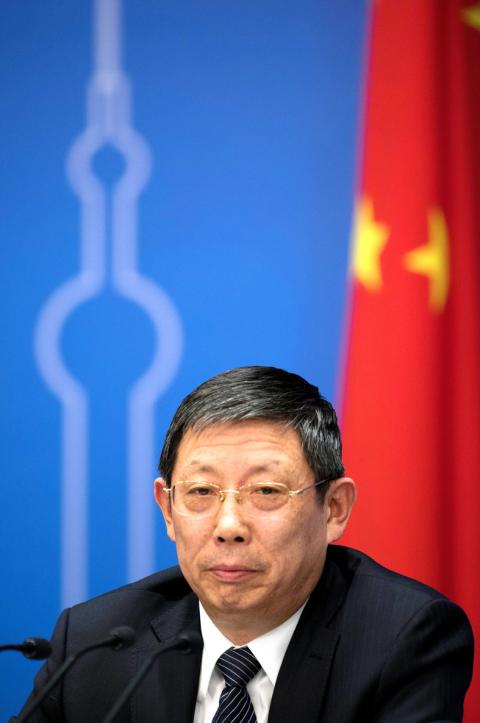The opening of US entertainment giant Walt Disney Co’s first theme park in China has been delayed until early 2016, Disney said on Tuesday.
Chief executive Robert Iger said the delay would push the debut of the Shanghai version of the Magic Kingdom from later this year to spring 2016. No reason for the delay was given.
The English-language China Daily newspaper reported last month that there might be “some difficulty” with an opening this year. Disney and its Chinese partner, Shanghai Shendi Group (上海伸地集團), broke ground on the park in April 2011.

Photo: AFP
The park is to be Disney’s third in Asia, after Hong Kong and Tokyo. Disney has parks in California and Florida, as well as near Paris.
A partially completed hotel, castle and artificial mountain were visible within the tightly guarded site on Monday, Agence France-Presse journalists saw.
Last week, Shanghai Mayor Yang Xiong (楊雄) said the basic construction of the park and other facilities would be completed this year.
“As for the exact opening date, I guess we still need to do more preparatory work and have further discussions with the Walt Disney Co, as well as other Chinese partners,” Yang said.
Revenue from Disney parks and resorts rose 9 percent to US$3.9 billion in the final three months of last year, as more people visited its California and Florida properties than in any quarter and spent more money there.
In an interview with CNBC, Iger said the entertainment company is seeing no discernible impact on attendance or bookings from the international measles outbreak linked last month to Disney’s southern California parks.
Iger did say that parents with children under the age of inoculation should be cautious about bringing them to any large public place like Disneyland, including using mass transportation and attending movie theaters.
Strong results from the parks, Disney Channels and sales of Frozen merchandise drove earnings up 19 percent, the company said. The firm’s profit and revenue topped expectations for the first quarter, it added.
The Burbank, California-based company earned US$2.24 billion, or US$1.27 per share, topping the US$1.08 per share average estimate of analysts surveyed by Zacks Investment Research.
Revenue rose 9 percent to US$13.39 billion in the period, also exceeding Wall Street forecasts of US$12.85 billion, according to Zacks.
Shares rose US$3.65, or 3.9 percent, to US$97.75 on Tuesday during aftermarket trading in the US, after closing up 2.4 percent at US$94.10 before the report. The stock has been trading near its all-time high of US$96.43.
Additional reporting by AP

To many, Tatu City on the outskirts of Nairobi looks like a success. The first city entirely built by a private company to be operational in east Africa, with about 25,000 people living and working there, it accounts for about two-thirds of all foreign investment in Kenya. Its low-tax status has attracted more than 100 businesses including Heineken, coffee brand Dormans, and the biggest call-center and cold-chain transport firms in the region. However, to some local politicians, Tatu City has looked more like a target for extortion. A parade of governors have demanded land worth millions of dollars in exchange

Hong Kong authorities ramped up sales of the local dollar as the greenback’s slide threatened the foreign-exchange peg. The Hong Kong Monetary Authority (HKMA) sold a record HK$60.5 billion (US$7.8 billion) of the city’s currency, according to an alert sent on its Bloomberg page yesterday in Asia, after it tested the upper end of its trading band. That added to the HK$56.1 billion of sales versus the greenback since Friday. The rapid intervention signals efforts from the city’s authorities to limit the local currency’s moves within its HK$7.75 to HK$7.85 per US dollar trading band. Heavy sales of the local dollar by

Taiwan Semiconductor Manufacturing Co’s (TSMC, 台積電) revenue jumped 48 percent last month, underscoring how electronics firms scrambled to acquire essential components before global tariffs took effect. The main chipmaker for Apple Inc and Nvidia Corp reported monthly sales of NT$349.6 billion (US$11.6 billion). That compares with the average analysts’ estimate for a 38 percent rise in second-quarter revenue. US President Donald Trump’s trade war is prompting economists to retool GDP forecasts worldwide, casting doubt over the outlook for everything from iPhone demand to computing and datacenter construction. However, TSMC — a barometer for global tech spending given its central role in the

An Indonesian animated movie is smashing regional box office records and could be set for wider success as it prepares to open beyond the Southeast Asian archipelago’s silver screens. Jumbo — a film based on the adventures of main character, Don, a large orphaned Indonesian boy facing bullying at school — last month became the highest-grossing Southeast Asian animated film, raking in more than US$8 million. Released at the end of March to coincide with the Eid holidays after the Islamic fasting month of Ramadan, the movie has hit 8 million ticket sales, the third-highest in Indonesian cinema history, Film